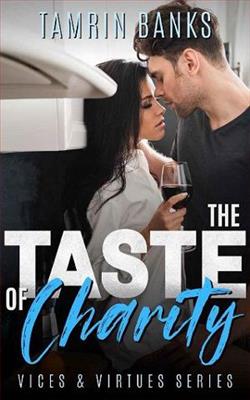Page 21 of Breathe
“Oh shit,” she said, putting her hand to her mouth. “I—I didn’t—” Crap, could she say one sentence to him tonight without making a complete arse of herself?
“It’s okay,” he said. He thought for a moment, while Ellen tried to bring the temperature in her cheeks down. He said, “I guess it’s a kind of fire I can control.”
He looked so serious for a moment; she couldn’t imagine why she’d ever seen him as shallow. “I’m sorry,” she said from behind her hand.
“You can make it up to me,” he said, as the waiter reappeared with their desserts. “Eat your cake. And, Ellen,” he added, when they were alone again, “if you want to keep up the stiff upper lip thing, you might want to quit blushing so adorably.”
And you might want to stop saying my name.
See, all I had to do was say no when he asked me to dinner. That was all I had to do. She could have taken Cabo back to a mostly cured Francesca, and taken up her offer of dinner instead. But he’d said her name, and she’d turned to mush. Was even this incredible chocolate event on her plate worth the humiliation?
She’d finished half of it before she could look at him again, but he was looking out the window, his dessert hardly touched, his expression serious. She followed his gaze, but only saw the debris from yesterday’s ticker tape parade. Then she saw a makeshift memorial from the Boston marathon bombing attached to the lamppost across from them: two red shirts tied into a cross and pinned to a board with “Boston Strong” written over it. Some flowers lay at its foot.
She looked at Kane again. He caught the slight movement of her head and focused on her. “Are you all done?” he said, still not smiling. She nodded. Joe appeared as if by magic with their bill, which Kane paid. She let him guide her out of her seat, into her coat and out the door.
The air had gotten a lot colder; Ellen held her collar closed and wished she’d brought gloves. Kane looked as if the cold wouldn’t dare bother him.
Ellen nodded at the memorial and said, “Did you know someone?”
“I think almost everyone knew someone,” he said. “But yes, I did. An old girlfriend from high school. We used to run together. She lost her foot.”
“I’m so sorry,” she said, and put her hand on his arm. “It was bad enough for me as an outsider. It must have been devastating for you.”
She had his full attention now. His eyes went from her hand to her face. “Were you in London when those bombs on the buses went off?” he said. She nodded. “Did you know someone?”
“No. But I had friends who were close at the time.” She hesitated, and then said, “Kane,” which was the first time she’d used his first name, “I’m sorry about your father.”
He nodded. Somehow she was standing in front of him, looking up at him, once more aware of how much taller than her he was. And how good he smelled. She took in a breath and swayed closer.
“You know,” he said, inches from her. “I don’t... talk about my family a whole lot. Especially not Thea and Gabe. There are a lot of people who’d like that kind of information.”
“What information?” she said, and smiled. “I told you; I’m not about to go looking for publicity.”
She wasn’t sure what she was doing, but when he quietly said her name, frowning a little, she didn’t back away. He seemed to close the gap very, very slowly, until Ellen, drunk on his height and scent and the sound of his voice, kissed him.











